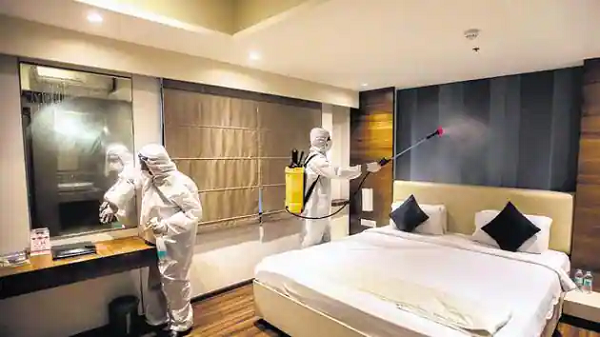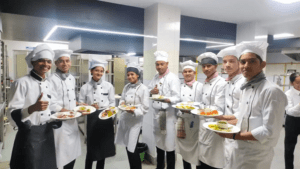Accomodation Operation III- In the context of the hospitality and travel industry, “accommodation operations” typically refer to the management and administration of lodging establishments such as hotels, motels, resorts, and other similar properties. These operations involve various aspects of running the property efficiently and providing a comfortable experience for guests. Here are some common types of accommodation operations:
- Hotels: Hotels are the most well-known type of accommodation. They range from budget to luxury and offer a variety of amenities and services such as restaurants, room service, fitness centers, and more.
- Resorts: Resorts often provide additional recreational facilities and entertainment options beyond basic lodging, such as pools, spas, golf courses, and organized activities.
- Motels: Motels (short for “motor hotels”) are typically located near highways or major roads, designed to cater to travelers who are on the road and need a convenient place to stay for a night.
- Bed and Breakfast (B&B): B&Bs are smaller establishments that provide lodging and breakfast. They offer a more personalized experience, often in historical or unique properties.
- Hostels: Hostels offer budget accommodations, often with shared dormitory-style rooms, communal kitchens, and a social atmosphere that encourages interaction among travelers.
- Inns: Inns are usually smaller properties that offer lodging and sometimes dining options. They can range from rustic country inns to boutique urban inns.
- Vacation Rentals: This category includes properties like vacation homes, cabins, cottages, and apartments that are rented out to travelers for short periods, often providing more space and amenities than traditional hotel rooms.
- Extended Stay Lodging: These accommodations cater to guests who need to stay for an extended period. They offer amenities like kitchenettes and laundry facilities.
- Campgrounds and RV Parks: These accommodations cater to travelers with camping equipment or recreational vehicles. They provide spaces for tents, RVs, and sometimes cabins.
- Serviced Apartments: Similar to vacation rentals, serviced apartments offer fully furnished units with kitchen facilities. They are designed for both short-term and long-term stays.
- Boutique Hotels: Boutique hotels are characterized by their unique design, intimate atmosphere, and personalized service. They often focus on providing a distinct and memorable experience.
- Floating Accommodations: These include houseboats, cruise ships, and other accommodations that are located on the water.
- Eco-Friendly Accommodations: These properties prioritize sustainability and environmentally friendly practices.
These are just a few examples of the many types of accommodation operations that exist in the hospitality and travel industry. Each type caters to different types of travelers and offers distinct experiences and amenities.
What is Accomodation Operation III
In educational settings, especially in hospitality and hotel management programs, courses are often divided into different levels or stages. “Hotel Accommodation Operation III” could be a course that builds upon the foundational knowledge and skills gained in earlier stages of the program. It might cover more advanced topics related to managing hotel accommodations, guest services, operations, and other relevant aspects of the hospitality industry.
The exact content of such a course could vary depending on the curriculum of the institution offering it. It might cover subjects like:
- Advanced front office operations
- Housekeeping management
- Revenue management
- Guest relations and customer service strategies
- Advanced reservations systems and technologies
- Quality assurance and standards in the hotel industry
- Crisis management and handling guest complaints
- Sustainability and eco-friendly practices in hotel operations
- Managing diverse teams and leadership skills in hospitality
If “Hotel Accommodation Operation III” is specific to a particular educational institution or program, I recommend reaching out to that institution or referring to the course syllabus or program description for detailed information about what the course covers. Keep in mind that information might have evolved since my last update, so it’s best to verify with the most current sources available to you.
How do I start Accomodation Operation III

To begin a course or program titled “Accommodation Operation III,” follow these general steps:
- Research and Identify Programs: Start by researching educational institutions that offer hospitality or hotel management programs. Look for programs that have a course titled “Accommodation Operation III” or something similar. Check universities, colleges, vocational schools, and online learning platforms.
- Check Prerequisites: Review the prerequisites for the course. It’s likely that “Accommodation Operation III” is an advanced course, so there might be prerequisites from earlier courses or levels in the same program.
- Apply for Admission: Once you’ve identified a program that offers “Accommodation Operation III,” follow the application process for admission. This typically involves submitting an application form, transcripts, letters of recommendation, and possibly a personal statement.
- Meet Admission Requirements: Make sure you meet the admission requirements for the program. This might include educational qualifications, language proficiency (if applicable), and other criteria.
- Enroll in the Program: Upon acceptance into the program, you’ll need to enroll. Follow the instructions provided by the institution for enrolling in the program and selecting your courses.
- Plan Your Schedule: Review the program’s curriculum and schedule. Determine when “Accommodation Operation III” will be offered and plan your schedule accordingly.
- Attend Classes: Attend the classes for “Accommodation Operation III” as per the schedule. Engage actively in the coursework, participate in discussions, and complete assignments.
- Study and Prepare: Since this is an advanced course, be prepared for more in-depth and specialized content. Study the material, do your assignments, and seek clarification if you have any questions.
- Engage with Instructors: Interact with your instructors, ask questions, and seek guidance when needed. They can provide valuable insights and support for your learning journey.
- Complete Assessments: Successfully complete the assessments, assignments, exams, or projects associated with the course. This will contribute to your overall grade for the course.
- Graduate: After completing the necessary coursework and meeting the program requirements, you’ll likely graduate from the program. This might involve earning a certificate, diploma, or degree, depending on the type of program.
Remember that the steps can vary based on the institution and the specific program you choose. Always refer to the official website of the educational institution offering the program for the most accurate and up-to-date information on the application and enrollment process.
Application of Accomodation Operation III
The application of “Accommodation Operation III” likely refers to how the knowledge and skills acquired in this advanced course can be practically used in real-world scenarios within the hospitality and accommodation industry. While the exact content of the course might vary depending on the institution offering it, here are some general areas where the concepts learned in such a course could be applied:
- Advanced Front Office Management: You might learn advanced techniques for managing front desk operations, handling reservations, managing check-in and check-out procedures, and optimizing room allocation.
- Housekeeping Management: Skills acquired in this area could be applied to efficiently manage housekeeping operations, ensuring cleanliness, room maintenance, and quality control.
- Revenue Management: Learn strategies for optimizing room rates, managing pricing during peak and off-peak seasons, and using data to maximize revenue.
- Guest Services: Apply techniques for providing exceptional guest experiences, handling special requests, and addressing guest concerns effectively.
- Technology Integration: Learn about the latest technologies used in the hospitality industry, such as property management systems, online booking platforms, and customer relationship management software.
- Quality Assurance: Apply quality control measures to maintain consistent standards throughout the accommodation facility, ensuring guest satisfaction.
- Sustainability: Implement sustainable practices in operations, such as energy conservation, waste reduction, and eco-friendly initiatives.
- Leadership and Team Management: Apply leadership skills to manage and motivate teams, ensuring smooth collaboration among different departments.
- Crisis Management: Apply strategies to handle emergencies, safety concerns, and unexpected situations while maintaining guest satisfaction.
- Customer Relationship Management: Learn how to build and maintain positive relationships with guests, encouraging repeat business and positive reviews.
- Data Analysis: Utilize data analysis skills to make informed decisions about occupancy rates, guest preferences, and operational efficiency.
- Innovation: Apply creative solutions to enhance guest experiences, whether through unique services, amenities, or event planning.
- Legal and Regulatory Compliance: Ensure compliance with local regulations, safety standards, and legal requirements in the hospitality industry.
- Networking and Industry Connections: Use the knowledge gained to connect with industry professionals and stay updated on industry trends and best practices.
The practical application of “Accommodation Operation III” knowledge will vary depending on the specific content covered in the course and the individual’s role within the hospitality or accommodation establishment. Graduates of this course might find opportunities in various roles such as hotel managers, front office managers, guest services managers, revenue managers, and more.
Case Study on Accomodation Operation III
Optimizing Guest Experience and Revenue Management
Background: You are the assistant manager of a luxury resort located in a popular tourist destination. The resort offers various types of accommodations, including rooms, suites, and private villas. The “Accommodation Operation III” course you completed has provided you with advanced skills in managing guest experiences, revenue optimization, and operational efficiency.
Challenge: The resort is approaching the peak holiday season, and your task is to ensure that the guest experience is exceptional while maximizing revenue. You need to use the knowledge gained from the course to address this challenge.
Solution:
- Advanced Reservations and Pricing Strategy: Apply advanced revenue management techniques learned in the course. Analyze historical data to identify demand patterns during different times of the year. Adjust pricing based on demand, implementing dynamic pricing that considers factors like booking lead time, occupancy rates, and seasonal trends.
- Upselling and Cross-Selling: Utilize upselling and cross-selling strategies to enhance the guest experience and increase revenue. Train the front office staff to identify opportunities to upsell room upgrades, special packages, and additional amenities during the booking process or upon check-in.
- Personalized Guest Experience: Implement personalized guest experiences using the CRM system. Utilize guest history and preferences to tailor services and amenities to individual guests. For example, if a guest has previously enjoyed spa treatments, offer them a spa package during their stay.
- Quality Assurance and Housekeeping Management: Apply housekeeping management techniques to ensure rooms are immaculate and well-maintained. Use the skills learned in the course to implement efficient housekeeping schedules, quality checks, and quick response to guest requests for room service or maintenance.
- Guest Feedback and Continuous Improvement: Implement guest feedback systems to gather insights about their experiences. Use this feedback to make real-time improvements and address any concerns promptly. This aligns with the course’s emphasis on continuous improvement and guest satisfaction.
- Sustainability Initiatives: Apply sustainable practices learned in the course to enhance the resort’s eco-friendly initiatives. Implement energy-saving measures, waste reduction strategies, and environmentally conscious guest amenities.
- Crisis Management Preparedness: Apply crisis management techniques learned in the course to ensure the resort is prepared to handle unexpected situations. Develop contingency plans for various scenarios, such as extreme weather or health emergencies.
Results: By applying the knowledge and skills gained from “Accommodation Operation III,” you successfully optimize the guest experience while maximizing revenue. The resort experiences increased guest satisfaction scores, higher occupancy rates, and positive online reviews. The personalized approach, revenue management strategies, and operational efficiencies contribute to a successful peak season for the resort.
This case study illustrates how the concepts from an advanced course like “Accommodation Operation III” can be practically applied to real-world scenarios within the hospitality industry. Keep in mind that the specifics of the case study will vary based on the curriculum of the course and the unique circumstances of the hospitality establishment.
White paper on Accomodation Operation III
Title: White Paper on Advanced Accommodation Operation Strategies
Abstract: This white paper explores the key strategies and concepts covered in the “Accommodation Operation III” course, designed to equip hospitality professionals with advanced skills for managing complex accommodation operations. Drawing on industry best practices and real-world case studies, this paper delves into the practical application of these strategies to enhance guest experiences, optimize revenue, and ensure operational excellence.
Table of Contents:
- Introduction
- Overview of the significance of advanced accommodation operation strategies
- Brief overview of the course “Accommodation Operation III”
- Advanced Front Office Management
- Dynamic room allocation techniques
- Managing room inventory during peak and off-peak seasons
- Advanced reservation systems and technologies
- Revenue Optimization
- Understanding demand patterns and market trends
- Implementing dynamic pricing strategies
- Upselling and cross-selling strategies
- Guest Experience Enhancement
- Personalization through guest data analysis
- Providing tailored amenities and services
- Utilizing CRM systems for guest engagement
- Quality Assurance and Housekeeping Management
- Efficient housekeeping schedules and quality checks
- Responding to guest requests promptly
- Maintaining consistency in room standards
- Sustainability and Eco-Friendly Practices
- Implementing energy-saving initiatives
- Waste reduction strategies
- Eco-friendly guest amenities
- Crisis Management and Preparedness
- Developing contingency plans for various scenarios
- Communication strategies during emergencies
- Ensuring guest safety and well-being
- Continuous Improvement and Guest Feedback
- Utilizing guest feedback for operational enhancements
- Encouraging positive online reviews
- Creating a culture of continuous improvement
- Conclusion
- Recap of key takeaways from the “Accommodation Operation III” course
- Emphasis on the practical application of advanced strategies in the hospitality industry
References: List of sources, studies, and industry reports referenced throughout the white paper.
Please note that this is a general outline, and the specific content of a white paper on “Accommodation Operation III” would depend on the curriculum, course objectives, and real-world examples covered in the actual course. If you’re looking for a specific white paper related to this topic, I recommend reaching out to educational institutions, professional organizations, or industry publications that specialize in hospitality management.






